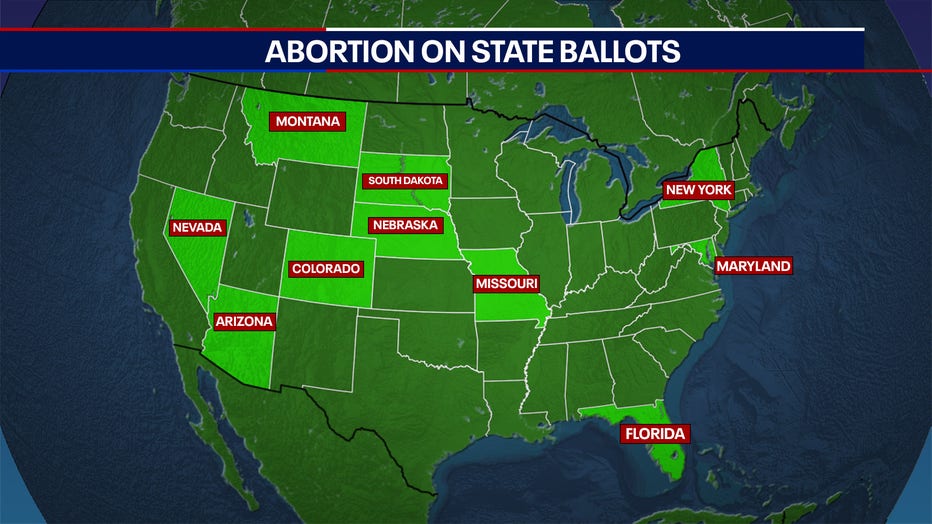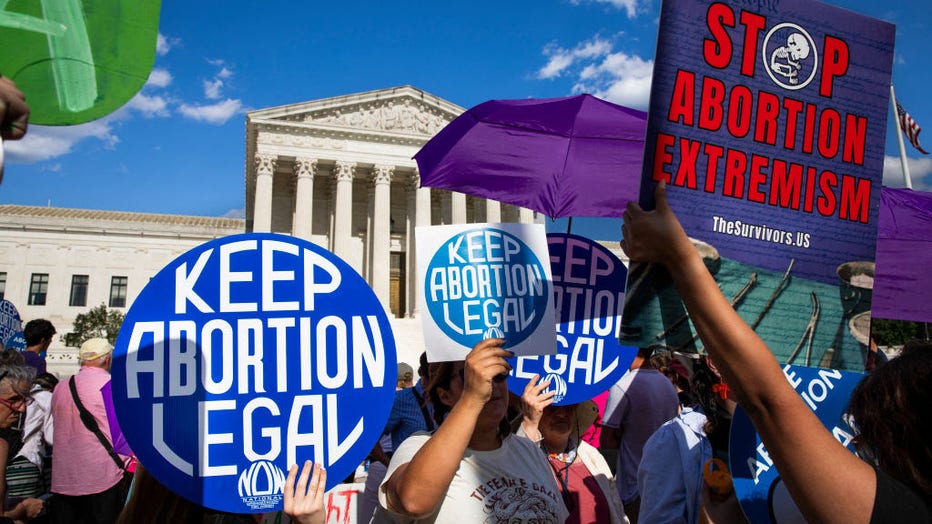Election 2024: Here’s how states voted on abortion rights
Abortion rights win in 7 states, lose in 3
Madeline Summerville, attorney and political analyst, joined LiveNOW from FOX to discuss the results of several abortion-related ballot issues.
WASHINGTON - A major issue in the November election was abortion rights. Aside from the issue’s impact on the presidential race, voters in several states had their say on measures to expand or limit abortion rights.
Most Republican-controlled states have passed abortion restrictions since the 2022 ruling, including 14 that ban abortion at every stage of pregnancy. Most Democratic-led states have laws or executive orders to protect access.
Voters in all seven states that have had abortion questions before voters since 2022 have sided with abortion rights supporters.

Here’s how the 10 states voted in 2024:
Arizona, passed
Arizona voted to approve to amend the state constitution to add the right to an abortion up to about 24 weeks into pregnancy.
The amendment would prevent Arizona from banning abortions before a fetus can survive outside the womb and would allow later abortions to protect a woman’s physical or mental health.
Opponents said this goes too far and could lead to unlimited and unregulated abortions in Arizona. Supporters say it would keep abortion access free from political interference.
Abortion was currently legal for the first 15 weeks of pregnancy in Arizona.
Colorado, passed
Voters in Colorado approved a measure to enshrine abortion protections in the state constitution, along with requirements that Medicaid and private health insurers cover abortion, made the ballot for the fall election.
Florida, rejected
Florida voters rejected ballot measures Tuesday to protect abortion rights, handing a victory to Republican Gov. Ron DeSantis, who used state resources and campaigned heavily to defeat the issues.
The amendment pulled in over 6 million ‘yes’ votes – 57.1% of the total – but the Florida state constitution requires approval from 60% of voters.
The abortion measure would have prevented lawmakers from passing any law that penalized, prohibited, delayed or restricts abortion until fetal viability, which doctors say is sometime after 21 weeks. The state’s restrictive six-week abortion law still stands. Florida is one of the first states to reject abortion rights in a ballot measure since Roe v. Wade was overturned.
Former president Donald Trump went back and forth on how he would vote on the state’s abortion rights initiative before finally saying he would oppose it.
Maryland, passed
Marylanders voted to approve to enshrine the right to abortion in the state’s constitution.

FILE - Abortion rights and anti-abortion rights activists are protesting in front of the US Supreme Court in Washington, DC on June 24, 2024. (Photo by Aashish Kiphayet / Middle East Images / Middle East Images via AFP Getty Images)
Missouri, passed
Missouri voters decided to approve a right to abortion with a constitutional amendment that would reverse the state’s near-total ban.
Montana, passed
Voters in Montana approved an amendment to the state constitution that bars the government from denying the right to abortion before viability — generally considered to be about 23 or 24 weeks’ gestational age — or when it is necessary to protect the life or health of the pregnant person.
Abortion was already legal until viability in the state under a 1999 Montana Supreme Court opinion.
Nebraska, rejected
Nebraska had mixed votes on two competing abortion measures.
Voters adopted a measure that allows more abortion restrictions and enshrines the state's current 12-week ban.
Voters rejected a competing measure that would have ensured abortion rights.
Nevada, passed
A passed amendment in Nevada would ensure abortion access for the first 24 weeks of pregnancy — or later to protect the health of the pregnant woman.
To change the constitution, voters will need to approve it again in 2026.
New York, passed
New Yorkers approved a measure that would bar unequal treatment based on "pregnancy outcomes" and "reproductive healthcare and autonomy," along with sex, sexual orientation, gender identity, national origin and disability.
South Dakota, rejected
South Dakota voters rejected a constitutional amendment that would prevent any restrictions on abortion in the first trimester of pregnancy.
The Source: The Associated Press contributed to this report. The information in this story was compiled from several ballot initiatives in the aforementioned states. This story was reported from Los Angeles.

